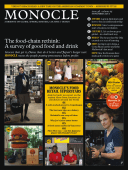
Issue 48
Monocle’s food retail superstars: we report on the tastiest ideas from counters to checkouts around the world.
In This Issue
Oops! No content was found.
Looks like we no longer have content for the page you're on. Perhaps try a search?
Return Home

